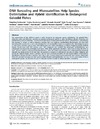Identificador persistente para citar o vincular este elemento:
https://accedacris.ulpgc.es/jspui/handle/10553/43554
| Título: | DNA barcoding and microsatellites help species delimitation and hybrid identification in endangered galaxiid fishes | Autores/as: | Vanhaecke, Delphine Garcia de Leaniz, Carlos Gajardo, Gonzalo Young, Kyle Sanzana, Jose Orellana, Gabriel Fowler, Daniel Howes, Paul Monzon Argüello, Catalina Consuegra, Sofia |
Clasificación UNESCO: | 2401 Biología animal (zoología) 2409 Genética |
Palabras clave: | Endangered species Microsatellite loci Mitochondrial DNA |
Fecha de publicación: | 2012 | Publicación seriada: | PLoS ONE | Resumen: | The conservation of data deficient species is often hampered by inaccurate species delimitation. The galaxiid fishes Aplochiton zebra and Aplochiton taeniatus are endemic to Patagonia (and for A. zebra the Falkland Islands), where they are threatened by invasive salmonids. Conservation of Aplochiton is complicated because species identification is hampered by the presence of resident as well as migratory ecotypes that may confound morphological discrimination. We used DNA barcoding (COI, cytochrome b) and a new developed set of microsatellite markers to investigate the relationships between A. zebra and A. taeniatus and to assess their distributions and relative abundances in Chilean Patagonia and the Falkland Islands. Results from both DNA markers were 100% congruent and revealed that phenotypic misidentification was widespread, size-dependent, and highly asymmetric. While all the genetically classified A. zebra were correctly identified as such, 74% of A. taeniatus were incorrectly identified as A. zebra, the former species being more widespread than previously thought. Our results reveal, for the first time, the presence in sympatry of both species, not only in Chilean Patagonia, but also in the Falkland Islands, where A. taeniatus had not been previously described. We also found evidence of asymmetric hybridisation between female A. taeniatus and male A. zebra in areas where invasive salmonids have become widespread. Given the potential consequences that species misidentification and hybridisation can have for the conservation of these endangered species, we advocate the use of molecular markers in order to reduce epistemic uncertainty. | URI: | https://accedacris.ulpgc.es/handle/10553/43554 | DOI: | 10.1371/journal.pone.0032939 | Fuente: | PLoS ONE, v. 7 (3) (e32939) |
| Colección: | Artículos |
Citas SCOPUSTM
38
actualizado el 08-jun-2025
Citas de WEB OF SCIENCETM
Citations
36
actualizado el 12-ene-2026
Visitas
49
actualizado el 11-ene-2026
Descargas
66
actualizado el 11-ene-2026
Google ScholarTM
Verifica
Altmetric
Comparte
Exporta metadatos
Los elementos en ULPGC accedaCRIS están protegidos por derechos de autor con todos los derechos reservados, a menos que se indique lo contrario.
